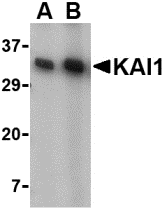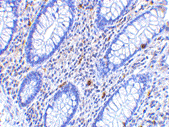Catalog#:4073
KAI1 was initially identified from a T-cell activation study as a four-transmembrane protein that plays an accessory role in T-cell activation, and was later determined to act as a cancer metastasis suppressor gene. This protein is ubiquitously expressed at moderate to high levels in most tissues, but its expression is downregulated during tumor progression. The loss of KAI1 and p53 is associated with poor survival for prostate and other cancer patients. Recently, KAI1 was found to interact with DARC, the Duffy antigen for chemokines using a yeast two hybrid screen. It is thought that tumor cells dislodged from the primary tumor and expressing KAI1 interact with DARC proteins expressed on vascular cells, transmitting a senescent signal to the tumor cells, while tumor cells that have lost KAI1 expression can proliferate and potentially give rise to metastases. At least two isoforms of KAI1 are known to exist.
Additional Names: KAI1 (CT), CD82 antigen, tetraspanin-27, Tspan-27, suppressor of tumorgenicity-6

Description
Left: Western blot analysis of KAI1 in A549 cell lysate with KAI1 antibody at (A) 0.5 and (B) 1 µg/ml.
Below: Immunohistochemistry of KAI1 in human colon tissue with KAI1 antibody at 2.5 μg/ml.
Other Product Images

Description
Left: Western blot analysis of KAI1 in A549 cell lysate with KAI1 antibody at (A) 0.5 and (B) 1 µg/ml.
Below: Immunohistochemistry of KAI1 in human colon tissue with KAI1 antibody at 2.5 μg/ml.
Other Product Images
 Source:KAI1 antibody was raised against a 15 amino acid peptide from near the carboxy terminus of human KAI1.
Source:KAI1 antibody was raised against a 15 amino acid peptide from near the carboxy terminus of human KAI1.
Purification: Affinity chromatography purified via peptide column
Clonality and Clone: This is a polyclonal antibody.
Host: KAI1 antibody was raised in rabbit.
Please use anti-rabbit secondary antibodies.
Application: KAI1 antibody can be used for detection of KAI1 by Western blot at 0.5 – 1 µg/ml.
Tested Application(s): E, WB, IHC
Buffer: Antibody is supplied in PBS containing 0.02% sodium azide.
Blocking Peptide:Cat.No. 4073P - KAI1 Peptide
Long-Term Storage: KAI1 antibody can be stored at 4ºC, stable for one year. As with all antibodies care should be taken to avoid repeated freeze thaw cycles. Antibodies should not be exposed to prolonged high temperatures.
Positive Control:
1. Cat. No. 1203 - A549 Cell Lysate
2. Cat. No. 1320 - Human Colon Tissue Lysate
Species Reactivity: H, M, R
GI Number: 4504813
Accession Number: NP_002222
Short Description: (CT) a tumor metastasis suppressoer gene
References
1. HW Gaugitsch, Hofer E, Huber NE, et al. A new superfamily of lymphoid and melanoma cell proteins with extensive homology to Schistosoma mansoni antigen SM23. Eur. J. Immunol. 1991; 21:377-83.
2. Gil ML, Vita N, Lebel-Binay S, et al. A member of the tetra spans transmembrane protein superfamily is recognized by a monoclonal antibody raised against an HLA class I-deficient, lymphokine-activated killer-susceptible, B lymphocyte line. Cloning and functional studies. J. Immunol. 1992; 2826-33.
3. Dong JT, Lamb PW, Rinker-Schaeffer CW, et al. KAI1, a metastasis suppressor gene for prostate cancer on human chromosome 11p11.2. Science 1995; 884-86.
4. Kauffman EC, Robinson VL, Stadler WM, et al. Metastasis suppression: the evolving role of metastasis suppressor genes for regulating cancer cell growth at the secondary site. J. Urol. 2003; 169:1122-33

No comments:
Post a Comment